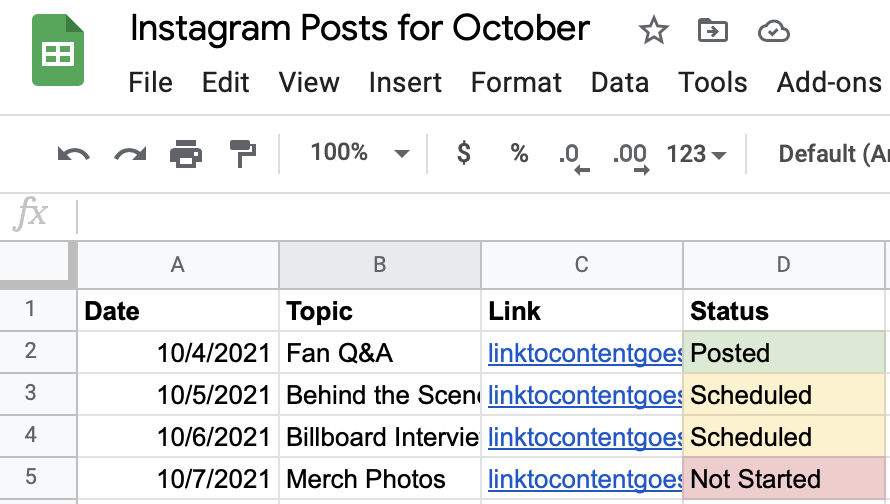We all know how important social media is in the music industry. No matter which socials you use, consistency is the key to growth on any platform. Having a social media content calendar can help you do just that. Want to save time and increase engagement? Here’s how creating a content schedule can get you there.
How To Create a Social Media Content Calendar for Musicians
Why Should You Use a Content Calendar?
Over the years, marketers have found consistency to be one of the most important factors driving social media success. When you don’t care about how many people see your posts, you can post anything at any time. However, if a major part of your sales (or streams) comes from social media, you need to optimize your efforts wherever you can.
What day of the week and time of day you post certain content can directly impact engagement, lead generation, and reach for that platform. Even if you don’t follow your content schedule to a T, it’ll save you a lot of time and give you a good outline to keep you organized and on track.
Goal Orientated Mindsets Work
When it comes to social media, you could post blindly and hope for the best… but you shouldn’t. You should always have overarching goals in mind with every piece of content you publish.
Whichever platform you’re on, ask yourself:
- “Do I want more engagement on this platform?”
- “Am I trying to promote a concert or an event?”
- “Am I actively selling something?” (albums, pre-saves, merch, etc.)
For example, if you’re looking for more engagement, you can do things like polls, fan Q&As, or duet challenges (e.g., TikTok trends). If you’re trying to better promote yourself, try countdown graphics, teaser videos, or Stories with swipe-up links. If you want more sales, run merch giveaways, limited-time discount codes, or exclusive early access for show tickets.
With your goals in mind, you can reassess your content calendar as you go along and utilize content that will push you toward those goals. Of course, everything doesn’t have to be squeaky clean and perfectly strategized. (Trust me, nobody’s perfect and nobody wants you to be.) Just be authentically you while still keeping an overarching strategy in mind to make sure you’re at least on the right track.
——
📚 Sharpen your skills…
How To Use Instagram Analytics To Your Advantage as an Artist
Useful Social Media Management Tools for Musicians in 2024
Why Gen Z’s Matter To The Music Industry
How To Use User-Generated Content To Market Your Music
——
How To Create Your Content Calendar:
There are tons of great tools available online to help you craft the perfect content calendar. Agorapulse, SproutSocial, and Evernote are all great options.
If you’re anything like me (a creature of habit and afraid of change), Google Drive is a perfect option for those who are just getting started with content planning. It’s free and easy to use, plus you’re probably already familiar with it. In addition, everything is saved to the cloud and you can share, brainstorm, and give edit access to everyone on your team.
Step 1: Create a list of core content ideas.
To help you get started, here are some topics to consider: lyric videos, behind-the-scenes footage, song promo, media coverage, Q&A’s, etc. are all good ideas to keep in your arsenal. (Keep this going as far as your heart desires. — The more ideas you can come up with, the better.)
Step 2: Share this list with your team.
Let your teammates make edits, suggestions, and additions to your list. Watch it grow, and edit as necessary.
Step 3: Create another list of content you already have.
Take note of what did well in the past, and plan to repurpose it in the future.
Step 4: Once you’ve got your brainstorming down, you’re ready to create your content calendar!
Now that you’ve got a healthy list of topics, it’s time to start scheduling. To do this, create a Google Sheet where you can log the date, topic, link, and status of your content.It should look something like this:
Now you can create separate calendars for all your socials and keep track of what’s been done, what’s new, and what’s ready to be repurposed elsewhere.
That’s it!
As you go along, you can add new ideas, brainstorm, and change your schedule to accommodate whatever your brand needs to improve. Want to switch up your end goal? No problem. Got some new content ideas? Add it to the calendar! Having a content calendar not only keeps you on track but will also help you see what you’ve already done all in one place. With everything right in front of you, coming up with new ideas and managing your content is easier than ever.
You got this.




